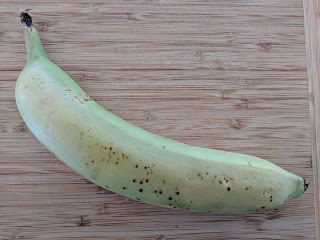Check out that banana. Before today, if that were your only banana and you offered it to me—and if I were really hungry—I'd politely decline your gracious offer. I would have decided based on the assumption that I know a good banana when I see one. My experience over six-plus decades told me that bananas ripen from green (ugh) to yellow (uh) to traces of brown (yum) to full brown (oh-no) to black (yuk), but they are not quite right if they evolve into a weird mix of forget-me-not green, barely yellow, and specks of brown. You can keep your banana, thank you.
But I've been reading a lot of books lately that have confirmed my conviction to argue with my own data: Hans Rosling's Factfulness, Steven Pinker's Enlightenment Now, and Michael Lewis's The Undoing Project, all worthwhile reads. I have always been skeptical about data, a disposition I regularly urge my students to take. I tell them to see not only both sides of an argument but multiple ones. Such thinking may reverse their opinions, strengthen some they already have, and maybe even create new ones. Then how could I not accept your banana?
Realizing my hypocrisy, I peeled the banana and took a bite. It was delightfully delicious, and I was decidedly wrong in my banana analytics. After devouring that banana in seconds, I realized the need to reinvent my entire banana hue spectrum. Of course, I won't go monochromatic in choosing bananas, but I'll have to add more data to my choosing, such as their feel and smell. What a world I've opened to myself!
Come on, you know you've been wrong about your data too. Can you think of an instance? Keep analyzing in all you do at work, school, home, and playground.
But I've been reading a lot of books lately that have confirmed my conviction to argue with my own data: Hans Rosling's Factfulness, Steven Pinker's Enlightenment Now, and Michael Lewis's The Undoing Project, all worthwhile reads. I have always been skeptical about data, a disposition I regularly urge my students to take. I tell them to see not only both sides of an argument but multiple ones. Such thinking may reverse their opinions, strengthen some they already have, and maybe even create new ones. Then how could I not accept your banana?
Realizing my hypocrisy, I peeled the banana and took a bite. It was delightfully delicious, and I was decidedly wrong in my banana analytics. After devouring that banana in seconds, I realized the need to reinvent my entire banana hue spectrum. Of course, I won't go monochromatic in choosing bananas, but I'll have to add more data to my choosing, such as their feel and smell. What a world I've opened to myself!
Come on, you know you've been wrong about your data too. Can you think of an instance? Keep analyzing in all you do at work, school, home, and playground.
